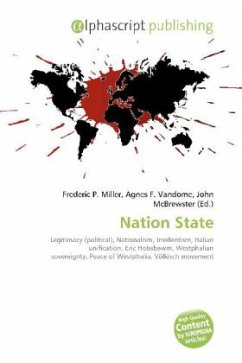Please note that the content of this book primarily consists of articles available from Wikipedia or other free sources online. The nation-state is a state that self-identifies as deriving its political legitimacy from serving as a sovereign entity for a country as a sovereign territorial unit. The state is a political and geopolitical entity; the nation is a cultural and/or ethnic entity. The term "nation-state" implies that the two geographically coincide, and this distinguishes the nation state from the other types of state, which historically preceded it. The origins and early history of nation-states are disputed. A major theoretical issue is: "which came first the nation or the nation state?" For nationalists themselves, the answer is that the nation existed first, nationalist movements arose to present its legitimate demand for sovereignty, and the nation-state met that demand. Some "modernisation theories" of nationalism see the national identity largely as a product of government policy, to unify and modernise an already existing state. Most theories see the nation state as a 19th-century European phenomenon, facilitated by developments such as mass literacy and the early mass media.







